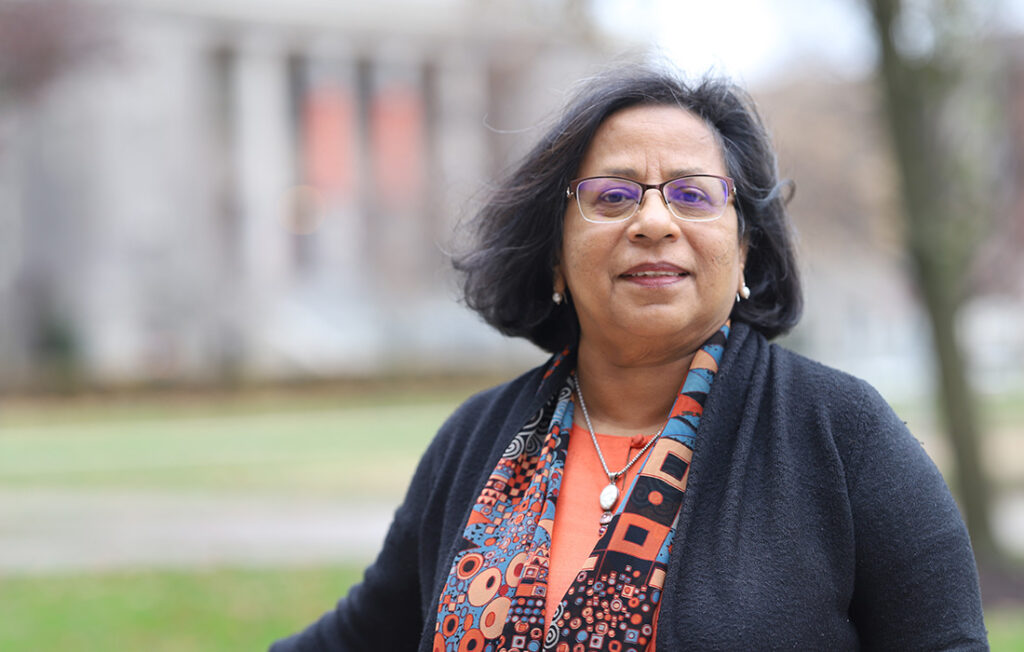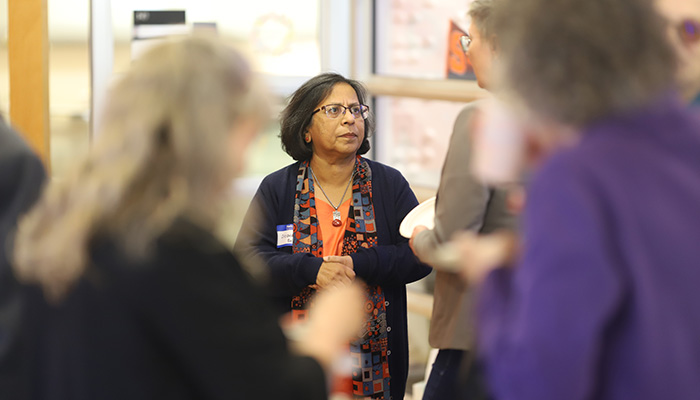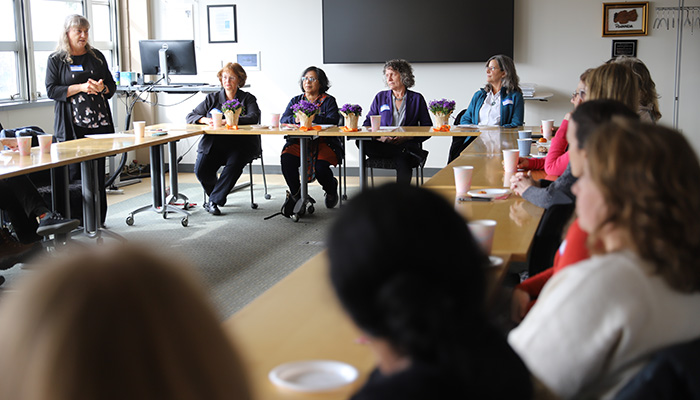
The College of Engineering and Computer Science (ECS) is proud to announce Professor Shobha K. Bhatia as the recipient of the Chancellor’s Citation for Excellence Lifetime Achievement Award. From research and teaching to diversity, equity, and inclusion initiatives, her outstanding contributions have made her a leading figure within her fields of study and ECS. As Bhatia prepares to retire, she leaves a legacy of inclusion, empowerment and environmental justice, inspiring hundreds of students and colleagues to do the same.
“The Chancellor’s Award means a lot. The greatest honor is that my colleagues took time to nominate me,” says Bhatia. “My students [at Syracuse] and colleagues from around the country and abroad wrote beautiful letters. I’m thrilled to receive this award.”
Bhatia completed both her bachelor’s and master’s degrees in civil engineering at IIT Roorkee, India in 1971 and 1973. She went on to earn her Ph.D. as a Commonwealth Scholar at the University of British Columbia, Vancouver in 1980. While searching for a job, she initially didn’t consider the College of Engineering and Computer Science as an option. However, when her husband, Tej Bhatia, became a faculty member at Syracuse University’s Languages, Literatures and Linguistics (LLL) Department, she decided to join him.
Aside from the chilly weather, Bhatia wasn’t sure what to expect when she first arrived at Syracuse University. She was the only female faculty member in ECS at the time and the only full female professor in the engineering college until 2008. This experience defined her approach to supporting colleagues and students.
“Syracuse University made me feel like this was my university, my work – my voice meant something. I want to give the same feeling to my students – it’s their university, their department, their lab.”

Infusing environmental justice and sustainability in her research goals, Bhatia is an influential figure in geotechnical engineering. Her research on geotextile tubes has critical applications in containment systems and filters. She also developed the Bubble Point technique, which more accurately evaluates geotextile filters used in roads and landfills. The American Society for Testing Materials (ASTM) recognized the increased efficiency and accuracy of the Bubble Point technique and has adopted it as a standard test method.
Bhatia has published over 150 articles and book chapters covering topics that range from soil materials and erosion control to road and building construction and the protection of water quality. She has taught many courses at Syracuse University, as well as guest lectures and seminars in the United States, Mexico, India, Singapore, and the United Kingdom among others. Bhatia also served as a consultant with the U.S. Army Corps of Engineers Waterways Experiment Station on the dynamic analysis of the 340-foot-high Folson dam.
In addition to her impactful research and contributions, Bhatia has been instrumental in creating programs to support undergraduate students in their academics within the University. As co-director of Women in Science & Engineering (WiSE), she developed a learning community designed for first-year women in STEM. She has worked with the WiSE leadership team to establish the WiSE Future Professoriate Program for graduate students and the WiSE undergraduate Women of Color Career Preparation Program (WWoC), both of which provide support for women pursuing STEM degrees.

When reflecting on her work, Bhatia does not focus on what she has given to the University, but rather on what Syracuse University has given to her. “When I think about the times, I was the happiest working, it was with my students and colleagues. Working with them has always been a highlight. The Syracuse community has been wonderful, and I’ve been able to make lifelong friends.”
Bhatia has also received the 2024 USUCGER Diversity, Equity, and Inclusion (DEI) Award for her efforts toward improving DEI initiatives in geotechnical engineering and the 2025 Robert M. Koerner Award for her contributions to the geosynthetics industry.
She will continue her work at Syracuse University as a research faculty member for two additional years, working on several collaborative research projects in the U.S. and India. ECS will not be the same after Bhatia’s retirement, but her legacy of collaboration, innovation, and revolutionary research will benefit the university for years to come.
“People have been asking me how I feel but I’ve never retired before, so I don’t know what I feel. It’s a new experience for me,” Bhatia says. “It’s an interesting time for me to reflect because we don’t often take time to reflect…When I think about my accomplishments, it’s not about the number of papers I’ve published. It’s the people I’ve worked with and what we’ve been able to accomplish together.”
